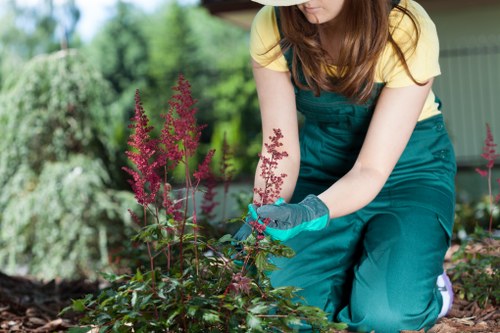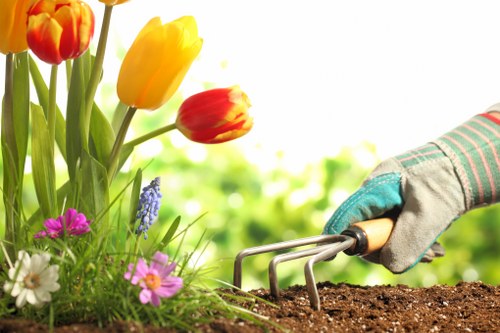Ultimate Guide to Garden Maintenance in West Ham
Introduction to Garden Maintenance

Maintaining a beautiful garden in West Ham requires dedication, knowledge, and the right tools. Whether your garden is a sprawling backyard or a modest urban space, proper maintenance ensures its health and aesthetics.
West Ham's climate and soil conditions present unique challenges and opportunities for garden enthusiasts. Understanding these factors is crucial for successful gardening.
In this guide, we'll explore essential garden maintenance practices tailored specifically for West Ham residents, helping you create and sustain a vibrant outdoor space.
Understanding West Ham’s Climate

West Ham experiences a temperate maritime climate, characterized by mild winters and cool summers. This climate influences the types of plants that thrive in the region and the maintenance routines required.
Rainfall is fairly consistent throughout the year, but summers can occasionally bring dry spells. Proper watering techniques are essential to keep your garden lush during drier months.
Wind is another factor to consider, as it can affect plant growth and soil moisture levels. Implementing windbreaks or strategically placing plants can mitigate its impact.
Soil Preparation and Care

Healthy soil is the foundation of a thriving garden. West Ham's soil can vary, so it's important to test your soil's pH and nutrient levels before planting.
Amending the soil with organic matter like compost improves its structure, fertility, and water retention capabilities. Regularly adding mulch can also help retain moisture and suppress weeds.
Proper drainage is crucial to prevent waterlogging, which can harm plant roots. Consider raised beds or installing drainage systems if necessary.
Choosing the Right Plants

Selecting plants that are well-suited to West Ham's climate ensures better growth and reduces maintenance efforts. Opt for native or hardy species that can withstand local weather conditions.
Incorporate a mix of perennials, annuals, shrubs, and trees to create a diverse and resilient garden ecosystem.
Consider plants with varying bloom times to maintain color and interest throughout the year.
Irrigation and Watering Strategies

Efficient irrigation is key to a healthy garden. Implementing a drip irrigation system can provide consistent moisture directly to the plant roots, minimizing water waste.
Watering early in the morning reduces evaporation and helps prevent fungal diseases. Deep watering encourages strong root growth.
Regularly check for leaks and ensure that your irrigation system is properly maintained to avoid overwatering or underwatering.
Pruning and Trimming

Pruning is essential for maintaining plant health and promoting vigorous growth. Remove dead or diseased branches to prevent the spread of pests and diseases.
Proper trimming shapes plants, enhances their appearance, and improves air circulation within the garden.
Different plants require different pruning techniques and timings. Research the specific needs of your garden's plants to ensure effective maintenance.
Pest and Disease Management

Managing pests and diseases is a critical aspect of garden maintenance. Regularly inspect plants for signs of infestation or illness.
Implement integrated pest management (IPM) practices, such as encouraging beneficial insects, using natural predators, and applying organic treatments when necessary.
Maintaining plant health through proper watering, fertilization, and pruning reduces susceptibility to pests and diseases.
Fertilizing and Soil Nutrition

Providing adequate nutrients ensures robust plant growth and vibrant blooms. Choose fertilizers based on your soil test results to address specific nutrient deficiencies.
Organic fertilizers, such as compost and well-rotted manure, improve soil structure and promote microbial activity.
Avoid over-fertilizing, which can lead to nutrient runoff and environmental issues. Follow recommended application rates for the best results.
Lawn Care and Maintenance

A well-maintained lawn enhances the overall appeal of your garden. Regular mowing, aeration, and overseeding keep the grass healthy and dense.
Control weeds promptly to prevent them from outcompeting your grass for nutrients and moisture.
Proper irrigation and fertilization are essential for a lush, green lawn. Adjust your care routine based on seasonal changes.
Seasonal Garden Tasks

Garden maintenance varies with the seasons. In spring, focus on planting new growth and preparing beds. Summer requires regular watering and pest control.
Autumn tasks include leaf removal, planting bulbs for spring, and preparing plants for winter. In winter, protect sensitive plants and plan for the upcoming gardening season.
Adapting your maintenance routine to seasonal changes ensures year-round garden health and beauty.
Garden Tools and Equipment

Having the right tools makes garden maintenance more efficient and effective. Essential tools include pruners, spades, hoes, and watering equipment.
Invest in high-quality, durable tools to withstand regular use and reduce the need for frequent replacements.
Maintain your tools by cleaning and sharpening them regularly. Proper storage prolongs their lifespan and ensures they're ready when needed.
DIY vs. Professional Garden Maintenance

Deciding between DIY and professional garden maintenance depends on your expertise, time, and the complexity of your garden.
DIY maintenance can be cost-effective and rewarding for those who enjoy hands-on gardening. However, professionals offer expertise and can handle larger projects efficiently.
Consider your garden's needs and your personal preferences when choosing the best maintenance approach.
Eco-Friendly Gardening Practices

Adopting eco-friendly practices benefits both your garden and the environment. Use sustainable methods such as composting, rainwater harvesting, and avoiding chemical pesticides.
Planting native species supports local biodiversity and reduces the need for extensive maintenance.
Implementing mulch and organic fertilizers minimizes waste and promotes soil health.
Creating a Maintenance Schedule

Establishing a maintenance schedule ensures consistent care and prevents tasks from being overlooked. Outline daily, weekly, monthly, and seasonal tasks for comprehensive upkeep.
Use gardening apps or planners to track your maintenance activities and set reminders for important tasks.
Regularly review and adjust your schedule based on your garden's evolving needs and seasonal changes.
Conclusion

Effective garden maintenance in West Ham hinges on understanding the local climate, soil conditions, and plant requirements. By implementing the strategies outlined in this guide, you can cultivate a thriving and beautiful garden year-round.
Whether you choose to maintain your garden yourself or enlist professional help, dedication and informed practices are key to success.
**Contact us today** to learn more about our garden maintenance services tailored for West Ham residents. **Book your service now** and transform your outdoor space into a serene haven.
